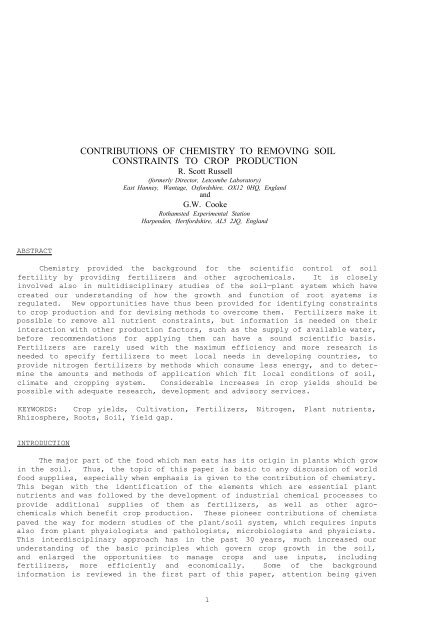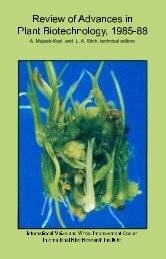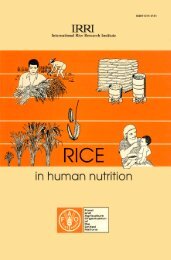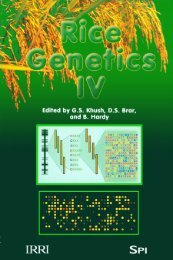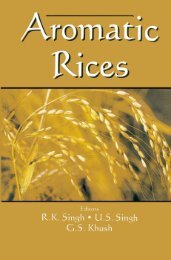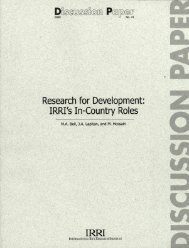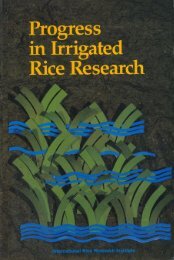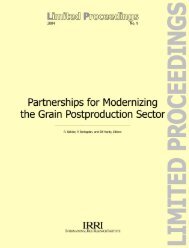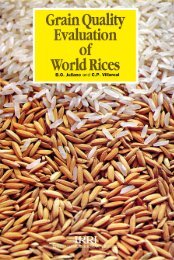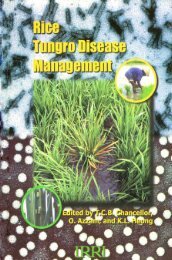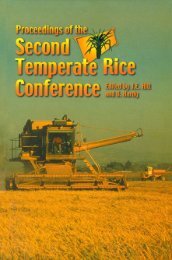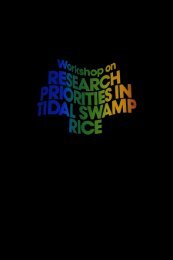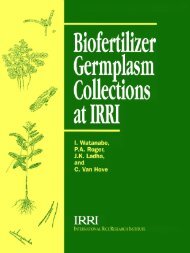- Page 2 and 3: CHEMISTRY AND WORLD FOOD SUPPLIES:T
- Page 4 and 5: INTERNATIONAL UNION OF PURE AND APP
- Page 6 and 7: CONTENTSOrganizing CommitteePreface
- Page 8 and 9: viiAmino Acid Production and Use to
- Page 10: CHEMRAWN II COMMITTEEGeneral Chairm
- Page 13 and 14: xii- Second, to strengthen scientif
- Page 15: xivACKNOWLEDGEMENTSIn addition to t
- Page 20 and 21: REMOVING SOIL CONSTRAINTS TO CROP P
- Page 22 and 23: REMOVING SOIL CONSTRAINTS TO CROP P
- Page 24 and 25: REMOVING SOIL CONSTRAINTS TO CROP P
- Page 26 and 27: REMOVING SOIL CONSTRAINTS TO CROP P
- Page 28 and 29: REMOVING SOIL CONSTRAINTS TO CROP P
- Page 30 and 31: REMOVING SOIL CONSTRAINTS TO CROP P
- Page 32 and 33: REMOVING SOIL CONSTRAINTS TO CROP P
- Page 34 and 35: REMOVING SOIL CONSTRAINTS TO CROP P
- Page 36 and 37: REMOVING SOIL CONSTRAINTS TO CROP P
- Page 38 and 39: DEVELOPING MORE EFFICIENT FERTILIZE
- Page 40 and 41: DEVELOPING MORE EFFICIENT FERTILIZE
- Page 42 and 43: DEVELOPING MORE EFFICIENT FERTILIZE
- Page 44 and 45: DEVELOPING MORE EFFICIENT FERTILIZE
- Page 46 and 47: DEVELOPING MORE EFFICIENT FERTILIZE
- Page 48 and 49: DEVELOPING MORE EFFICIENT FERTILIZE
- Page 50: DEVELOPING MORE EFFICIENT FERTILIZE
- Page 53 and 54: 36 J. BruinsmaUnlike animals, plant
- Page 55 and 56: 38 J. Bruinsmaexerts its effect thr
- Page 57 and 58: 40 J. BruinsmaFigure 3.Figure 4: Ef
- Page 59 and 60: 42 J. Bruinsmaso that more ears per
- Page 61 and 62: 44 J. Bruinsmawatercore. In combina
- Page 64 and 65: IMPROVING THE PRODUCTIVITY OFPROBLE
- Page 66 and 67: IMPROVING THE PRODUCTIVITY OF PROBL
- Page 68 and 69:
IMPROVING THE PRODUCTIVITY OF PROBL
- Page 70 and 71:
IMPROVING THE PRODUCTIVITY OF PROBL
- Page 72:
IMPROVING THE PRODUCTIVITY OF PROBL
- Page 75 and 76:
58 K. Lal, A.S.R. Juo and B.T. Kang
- Page 77 and 78:
60 R. Lal, A. S.R. Juo and B.T. Kan
- Page 79 and 80:
62 R. Lal, A.S.R. Juo and B.T. Kang
- Page 81 and 82:
64 R. Lal, A.S.K. Juo and B.T. Kang
- Page 83 and 84:
66 R. Lal, A.S.R. Juo and B.T. Kang
- Page 85 and 86:
68 R. Lal, A.S.R. Juo and B.T. Kang
- Page 87 and 88:
70 R. Lal, A.S.R. Juo and B.T. Kang
- Page 89 and 90:
72 R. Lal, A.S.R. Juo and B.T. Kang
- Page 91 and 92:
74 R. Lal, A.S.R. Juo and B.T. Kang
- Page 93 and 94:
76 R. Lal, A.S.R. Juo and B.T. Kang
- Page 96 and 97:
NEW DEVELOPMENTS IN CHEMICAL CONTRO
- Page 98 and 99:
NEW DEVELOPMENTS IN CHEMICAL CONTRO
- Page 100 and 101:
NEW DEVELOPMENTS IN CHEMICAL CONTRO
- Page 102 and 103:
NEW DEVELOPMENTS IN CHEMICAL CONTRO
- Page 104 and 105:
NEW DEVELOPMENTS IN CHEMICAL CONTRO
- Page 106 and 107:
CHEMICAL TECHNIQUES FOR MONITORING
- Page 108 and 109:
POLLUTION OF SOIL AND WATER RESOURC
- Page 110 and 111:
POLLUTION OF SOIL AND WATER RESOURC
- Page 112:
POLLUTION OF SOIL AND WATER RESOURC
- Page 115 and 116:
98 J.C. Daviesconsumption. By 2000
- Page 117 and 118:
100 J.C. DaviesTable 2: Yields of S
- Page 119 and 120:
102 J.C. DaviesTOWARDS AN INTEGRATE
- Page 121 and 122:
104 J.C. Daviesboth of comprehensio
- Page 123 and 124:
106 J.C. Daviesit is vital that the
- Page 126 and 127:
PRINCIPAL DISEASES OF FOOD CROPSG.
- Page 128 and 129:
PRINCIPAL DISEASES OF FOOD CROPS 11
- Page 130 and 131:
PRINCIPAL DISEASES OF FOOD CROPS113
- Page 132 and 133:
PRINCIPAL DISEASES OF FOOD CROPS 11
- Page 134 and 135:
PRINCIPAL DISEASES OF FOOD CROPS 11
- Page 136:
PRINCIPAL DISEASES OF FOOD CROPS 11
- Page 140 and 141:
INTERACTION AMONG PESTS, DISEASES A
- Page 142 and 143:
INTERACTION AMONG PESTS, DISEASES A
- Page 144:
INTERACTION AMONG PESTS, DISEASES A
- Page 147 and 148:
130 M.D. Pathak and D. Daleare prov
- Page 149 and 150:
132 M.D. Pathnk and D. DaleTable 2:
- Page 151 and 152:
134 M.D. Pathak and D. Dale(Pal et
- Page 153 and 154:
136 M.D. Pathak and D. Daleresistan
- Page 155 and 156:
138 M.D. Pathak and D. Dalesignific
- Page 157 and 158:
140 M.D. Pathak and D. BileKlun, J.
- Page 159 and 160:
14 2 M.D. Pathak and D. Dalebicolor
- Page 161 and 162:
144 R.C. Saxenaspecific, nontoxic t
- Page 163 and 164:
146 R . C. Saxenaeating caterpi lla
- Page 165 and 166:
148 R.C. SaxenaFigure 2: Selected e
- Page 167 and 168:
150 R.C. SaxenaTable 1: Selected Ex
- Page 169 and 170:
152 R.C. Saxenastandardize commerci
- Page 171 and 172:
154 K. C. Saxenaconcept evoked cons
- Page 173 and 174:
156 R.C. Saxenaprecocenes induced i
- Page 175 and 176:
158 R . C. SaxenaBreeden, G.C., E.C
- Page 177 and 178:
160 R.C. SaxenaMian, L.S. and M.S.
- Page 180 and 181:
PHEROMONES AND OTHER RECENT DEVELOP
- Page 182 and 183:
BIOCHEMICAL PEST MANAGEMENT 165many
- Page 184 and 185:
BIOCHEMICAL PEST MANAGEMENT 167Tabl
- Page 186 and 187:
BIOCHEMICAL PEST MANAGEMENT 169asse
- Page 188:
BIOCHEMICAL PEST MANAGEMENT 171Hayn
- Page 191 and 192:
174 I.N. OkaTable 1. Foodgrain cons
- Page 193 and 194:
TABLE 2 Levels of Resistance to Imp
- Page 195 and 196:
178 I.N. Okadecomposing the plant r
- Page 197 and 198:
180 I.N. Okatanulus, Casnodea inter
- Page 199 and 200:
182 I.N. OkaPhilippines in the Masa
- Page 201 and 202:
184 I.N. OkaJohn, V.T., K.C. Long a
- Page 203 and 204:
186 D. Pimenteldeveloping nations,
- Page 205 and 206:
188 D. Pimentelhumans. However, no
- Page 207 and 208:
190 D. Pimenteld. Bioconcentration
- Page 209 and 210:
192 D. Pimentelaircraft. This metho
- Page 211 and 212:
194 D. Pimentelnutrients necessary
- Page 213 and 214:
196 D. PimentelJ. Behavioral and Ho
- Page 215 and 216:
198 D. PimentelFalcon, L.A. (1978).
- Page 217 and 218:
200 D. PimentelPimentel, D. (1961c)
- Page 220 and 221:
NITROGEN SOURCES AND ROUGHAGEIN RUM
- Page 222 and 223:
NITROGEN SOURCES AND ROUGHAGE IN RU
- Page 224 and 225:
NITROGEN SOURCES ANU ROUGHAGE IN RU
- Page 226 and 227:
NITROGEN SOURCES AND ROUGHAGE IN RU
- Page 228 and 229:
NITROGEN SOURCES AND ROUGHAGE IN RU
- Page 230 and 231:
NITROGEN SOURCES AND ROUWAGE IN RUM
- Page 232 and 233:
NITROGEN SOURCES AND ROUGHAGE IN RU
- Page 234 and 235:
NITROGEN SOURCES AND ROUGHAGE IN RU
- Page 236:
NITROGEN SOURCES AND ROUGHAGE IN RU
- Page 239 and 240:
222 T.R. PrestonInterval between ha
- Page 241 and 242:
224T.R. Prestonperformance.Figure 2
- Page 243 and 244:
226 T.R. PrestonTable 6 : Forage Fr
- Page 245 and 246:
228 T.R. Prestontechnology has most
- Page 247 and 248:
230 T.R. Prestonsupplementing with
- Page 249 and 250:
232 T.R. PrestonTable 11: Zebu Bull
- Page 251 and 252:
234 T.R. Prestonin this paper, sinc
- Page 253 and 254:
236 T.R. PrestonAnim. Prod. 1:150-1
- Page 255 and 256:
238E. ZimmerFigure 1contribute subs
- Page 257 and 258:
240E. ZimmerFigure 2feeding to that
- Page 259 and 260:
242 E. Zimmerecology, some addition
- Page 261 and 262:
244 E. ZimmerMoist Hay, Fighting Ag
- Page 263 and 264:
246 E. ZimmerCONCLUSIONSConservatio
- Page 266 and 267:
RECENT DEVELOPMENT IN FEED ADDITIVE
- Page 268 and 269:
RECENT DEVELOPMENT IN FEED ADDITIVE
- Page 270 and 271:
RECENT DEVELOPMENT IN FEED ADDITIVE
- Page 272 and 273:
RECENT DEVELOPMENT IN FEED ADDITIVE
- Page 274 and 275:
RECENT DEVELOPMENT IN FEED ADDITIVE
- Page 276 and 277:
RECENT DEVELOPMENT IN FEED ADDITIVE
- Page 278 and 279:
RECENT DEVELOPMENT IN FEED ADDITIVE
- Page 280 and 281:
RECENT DEVELOPMENT IN FEED ADDITIVE
- Page 282 and 283:
RECENT DEVELOPMENT IN FEED ADDITIVE
- Page 284:
RECENT DEVELOPMENT IN FEED ADDITIVE
- Page 287 and 288:
270 A. AumaitreFIGURE 1 : IMPORTANC
- Page 289 and 290:
272 A. AumaitreControl of Pregnancy
- Page 291 and 292:
274 A. Aumaitreto 36 and 40-42 g cr
- Page 293 and 294:
276 A. AumaitreThese fats should be
- Page 295 and 296:
278 A. AumaitreNutritional Balance
- Page 297 and 298:
280 A. Aumaitrerelations appears wh
- Page 299 and 300:
282 A. AumaitrePion, R. and Fauconn
- Page 301 and 302:
284 R.D. Guerrero IIIimportant is t
- Page 303 and 304:
286 R.D. Guerrero IIIIn Singapore.
- Page 305 and 306:
288 R.D. Guerrero IIIHoltz, W., S.
- Page 308 and 309:
CHEMISTRY IN THE CONTROL OF RUMINAN
- Page 310 and 311:
CHEMISTRY IN THE CONTROL OF DISEASE
- Page 312 and 313:
CHEMISTRY IN THE CONTROL OF DISEASE
- Page 314 and 315:
CHEMISTRY IN THE CONTROL OF DISEASE
- Page 316 and 317:
CHEMISTRY IN THE CONTROL OF DISEASE
- Page 318 and 319:
CHEMISTRY IN THE CONTROL OF DISEASE
- Page 320 and 321:
CHEMISTRY IN THE CONTROL OF DISEASE
- Page 322 and 323:
CHEMISTRY IN THE CONTROL OF DISEASE
- Page 324:
CHEMISTRY IN THE CONTROL OF DISEASE
- Page 327 and 328:
310 A.R. Graytrypanosomes which aff
- Page 329 and 330:
312 A.R. Grayof the environment (FA
- Page 331 and 332:
314 A.R. Grayprotein are particular
- Page 333 and 334:
316 A.R. GrayInternational Centre o
- Page 336 and 337:
SYNTHETIC FOODS: TECHNICAL, CULTURA
- Page 338 and 339:
SYNTHETIC FOODS: TECHNICAL, CULTURA
- Page 340 and 341:
SYNTHETIC FOODS: TECHNICAL, CULTURA
- Page 342 and 343:
SYNTHETIC FOODS: TECHNICAL, CULTURA
- Page 344 and 345:
SYNTHETIC FOODS: TECHNICAL, CULTURA
- Page 346 and 347:
NEW PROTEIN SOURCES OF FOOD AND FEE
- Page 348 and 349:
NEW PROTEIN SOURCES OF FOOD AND FEE
- Page 350 and 351:
NEW PROTEIN SOURCES OF FOOD AND FEE
- Page 352:
NEW PROTEIN SOURCES OF FOOD AND FEE
- Page 355 and 356:
338 A. Rutkowskifeeding potential d
- Page 357 and 358:
340 A. Rutkowskimany years in Europ
- Page 359 and 360:
34 2 A. Rutkowskiexample, while pre
- Page 361 and 362:
344 A. RutkowskiWASTE CONVERSION BY
- Page 363 and 364:
346 A. Kutkowskieconomically compet
- Page 365 and 366:
348 A. RutkowskiKapsiotis, G. D. (1
- Page 367 and 368:
350 K. Rajalakshmias in plants and
- Page 369 and 370:
352 K. Rajalakshmiby the two differ
- Page 371 and 372:
354 R. Rajalakshmionly among the po
- Page 373 and 374:
356 R. Rajalakshmiproportions of wh
- Page 375 and 376:
358 R. KajalakshmiPilson, M.E.Q. an
- Page 377 and 378:
360 J. MoolayilINTRODUCTIONFats are
- Page 379 and 380:
362 J. Moolayilthe last 10 years. (
- Page 381 and 382:
364 J. MoolayilMAJOR FAT SOURCES OF
- Page 383 and 384:
366 J. Moolayilflower has become po
- Page 385 and 386:
368 J. Moolayilbound to happen, esp
- Page 387 and 388:
370 J. Moolayilfollowing examples:
- Page 390 and 391:
RUMEN-PROTECTED AMINO ACIDSHeribert
- Page 392 and 393:
RUMEN-PROTECTED AMINO ACIDS 375The
- Page 394 and 395:
RUMEN-PROTECTED AMINO ACIDS 377used
- Page 396 and 397:
RUMEN-PROTECTED AMINO ACIDS 379meth
- Page 398:
RUMEN-PROTECTED AMINO ACIDS 381Ferg
- Page 401 and 402:
384 S. AraiEvery protein originates
- Page 403 and 404:
386 S. AraiFig. 2:Pictures of a Spi
- Page 405 and 406:
388 S. Araiproduct as a methionine
- Page 407 and 408:
390 S. AraiArai, S. (1980). In "Che
- Page 410 and 411:
EXPANDING AND IMPROVING THE FOOD SU
- Page 412 and 413:
EXPANDING AND IMPROVING THE FOOD SU
- Page 414:
EXPANDING AND IMPROVING THE FOOD SU
- Page 417 and 418:
400 J . Solms and M. Baclunannand b
- Page 419 and 420:
402 J. Solms and M. BachmannRecent
- Page 421 and 422:
404 J. Solms and M. Bachmannlike Sw
- Page 423 and 424:
406 J. Solms and M. BachmannSTORAGE
- Page 425 and 426:
408 J. Solms and M. BachmannFig. 1:
- Page 427 and 428:
410 J. Solms and M. BachmannSlater,
- Page 429 and 430:
412 T. Børresen and T. Strømdeman
- Page 431 and 432:
414 T. Børresen and T. Strømsatis
- Page 433 and 434:
416 T. Børresen and T. Stø r mFER
- Page 435 and 436:
418 T. Børresen and T. StrømFA0 (
- Page 438 and 439:
PROGRESS IN PRESERVATION OF FOODTHR
- Page 440 and 441:
PROGRESS IN PRESERVATION OF FOOD TH
- Page 442 and 443:
PROGRESS IN PRESERVATION OF FOOD TH
- Page 444 and 445:
PROGRESS IN PRESERVATION OF FOOD TH
- Page 446 and 447:
PROGRESS IN PRESERVATION OF FOOD TH
- Page 448 and 449:
PROGRESS IN PRESERVATION OF FOOD TH
- Page 450 and 451:
PROGRESS IN PRESERVATION OF FOOD TH
- Page 452:
PROGRESS IN PRESERVATION OF FOOD TH
- Page 455 and 456:
438 T. AkashiPRESENT APPLICATIONS O
- Page 457 and 458:
440 T. Akashia healthy diet. Amino
- Page 459 and 460:
44 2 T. AkashiRecombinant DNA and o
- Page 461 and 462:
444 R. Liu, Y. Xiong and C. Wangtem
- Page 463 and 464:
446 R. Liu, Y. Xiong and C. WangTab
- Page 465 and 466:
44 8 K. Liu, Y. Xiong and C. WangTa
- Page 467 and 468:
450 R. Liu, Y. Xiong and C. Wangatm
- Page 469 and 470:
452 R. Liu, Y. Xiong and C. WangGra
- Page 471 and 472:
454 I.E. LienerINACTIVATION OF PROT
- Page 473 and 474:
456 I.E. LienerTHE EFFECT OF BLACK
- Page 475 and 476:
458 I.E. LienerHCN. Ikediobe and Or
- Page 477 and 478:
460 I.E. LienerIt is the production
- Page 479 and 480:
462 I.E. LienerBitar, K. and J.G. R
- Page 482 and 483:
WATER ACTIVITY AND INTERMEDIATE MOI
- Page 484 and 485:
WATER ACTIVITY AND INTERMEDIATE MOI
- Page 486 and 487:
WATER ACTIVITY AND INTERMEDIATE MOI
- Page 488 and 489:
WATER ACTIVITY AND INTERMEDIATE MOI
- Page 490 and 491:
WATER ACTIVITY AND INTERMEDIATE MOI
- Page 492:
WATER ACTIVITY AND INTERMEDIATE MOI
- Page 495 and 496:
478 P. Roesslerfoodstuffs, cannot b
- Page 497 and 498:
480 P. Roesslerequipment manufactur
- Page 500 and 501:
OVERVIEW OF ASSESSMENT AND CONTROLR
- Page 502 and 503:
OVERVIEW OF ASSESSMENT AND CONTROL
- Page 504 and 505:
OVERVIEW OF ASSESSMENT AND CONTROL
- Page 506 and 507:
OVERVIEW OF ASSESSMENT AND CONTROL
- Page 508 and 509:
EFFECTS ON NUTRITIONAL QUALITY OF F
- Page 510 and 511:
EFFECTS ON NUTRITIONAL QUALITY OF F
- Page 512 and 513:
EFFECTS ON NUTRITIONAL QUALITY OF F
- Page 514 and 515:
EFFECTS ON NUIRITIONAL QUALITY OF F
- Page 516 and 517:
EFFECTS ON NUTRITIONAL QUALITY OF F
- Page 518 and 519:
EFFECTS ON NUTRITIONAL QUALITY OF F
- Page 520:
EFFECTS ON NUTRITIONAL QUALITY OF F
- Page 523 and 524:
506 H.B.S. Conachermany instances w
- Page 525 and 526:
508 H. B.S . Conachercan be observe
- Page 527 and 528:
510 H.B.S. ConacherTable 3: Typical
- Page 529 and 530:
512 H. B. S. Conacherthere is compe
- Page 531 and 532:
514 H.B.S. ConacherOchratoxins, Ste
- Page 533 and 534:
516 B.O. Julianonutrient content, o
- Page 535 and 536:
518 B.O. Julianotryptophan color is
- Page 537 and 538:
520 B.O. Juliano(Perez et al., 1973
- Page 539 and 540:
522 B.O. Julianospectrophotmetry (N
- Page 541 and 542:
524 B.O. JulianoJuliano, B.O., C.M.
- Page 544 and 545:
MULTIVARIATE ANALYSIS OF RAW MATERI
- Page 546 and 547:
MULTIVARIATE ANALYSIS OF RAW MATERI
- Page 548 and 549:
MULTIVARIATE ANALYSIS OF RAW MATERI
- Page 550 and 551:
MULTIVARIATE ANALYSIS OF RAW MATERI
- Page 552:
MULTIVARIATE ANALYSIS OF RAW MATERI
- Page 555 and 556:
538 A.E. Renderfree diet to deplete
- Page 557 and 558:
540 A.E. BenderVitamin EVitamin E p
- Page 559 and 560:
542 A. E. BenderEnergyMost of the p
- Page 561 and 562:
544 A.E. BenderSUBSTANCES THAT INTE
- Page 563 and 564:
546 A.E. BenderAshley, D. and E. He
- Page 565 and 566:
548 W. Baltespolitical bodies and n
- Page 567 and 568:
550 W. Baltesone should consider a
- Page 570 and 571:
OVERVIEW OF THE POTENTIAL AND PROSP
- Page 572 and 573:
POTENTIAL & PROSPECTS IN GENETIC EN
- Page 574 and 575:
POTENTIAL & PROSPECTS IN GENETIC EN
- Page 576 and 577:
POTENTIAL & PROSPECTS IN GENETIC EN
- Page 578 and 579:
POTENTIAL & PROSPECTS IN GENETIC EN
- Page 580 and 581:
APPLICATIONS OF GENETIC ENGINEERING
- Page 582 and 583:
APPLICATIONS OF GENETIC ENGINEERING
- Page 584 and 585:
APPLICATIONS OF GENETIC ENGINEERING
- Page 586 and 587:
THE APPLICATION OF WIDE CROSSES TO
- Page 588 and 589:
THE APPLICATION OF WIDE CROSSES TO
- Page 590 and 591:
THE APPLICATION OF WIDE CROSSES TO
- Page 592 and 593:
THE APPLICATION OF WIDE CROSSES TO
- Page 594 and 595:
IMPROVED CONVENTIONAL STRATEGIES AN
- Page 596 and 597:
STRATEGIES & METHODS FOR SELECTION/
- Page 598 and 599:
STRATEGIES & METHODS FOR SELECTION/
- Page 600 and 601:
STRATEGIES & METHODS FOR SELECTION/
- Page 602 and 603:
CHEMICAL, BIOLOGICAL, GENETIC, BIOL
- Page 604 and 605:
IMPROVED OR ALTERNATE TECHNOLOGIES
- Page 606 and 607:
IMPROVED OR ALTERNATE TECHNOLOGIES
- Page 608 and 609:
IMPROVED OR ALTERNATE TECHNOLOGIES
- Page 610 and 611:
IMPROVED OR ALTERNATE TECHNOLOGIES
- Page 612 and 613:
IMPROVED OR ALTERNATE TECHNOLOGIES
- Page 614 and 615:
IMPROVED OR ALTERNATE TECHNOLOGIES
- Page 616:
IMPROVED OR ALTERNATE TECHNOLOGIES
- Page 619 and 620:
602 L.G. Nickellmore sugar, more pr
- Page 621 and 622:
604 L.G. Nickellthe ability of gibb
- Page 623 and 624:
606 L.G. NickellNickell, L.G. (1928
- Page 625 and 626:
608 O.J.Crocomo and N. Ochoa-Alejom
- Page 627 and 628:
610 O.J.Crocomo and N. Ochoa-Alejoo
- Page 629 and 630:
612 O.J.Crocomo and N. Ochoa-Alejos
- Page 631 and 632:
614 O.J.Crocomo and N. Ochoa-Alejot
- Page 633 and 634:
616 O.J.Crocomo and N. Ochoa-Alejoi
- Page 635 and 636:
618 O.J.Crocomo and N. Ochoa-AlejoM
- Page 638 and 639:
PHOTOSYNTHETIC ACTIVITY AND PARTITI
- Page 640 and 641:
PHOTOSYNTHETIC ACTIVITY AND PARTITI
- Page 642 and 643:
PHOTOSYNTHETIC ACTIVITY AND PARTITI
- Page 644 and 645:
PHOTOSYNTHETIC ACTIVITY AND PARTITI
- Page 646 and 647:
PHOTOSYNTHETIC ACTIVITY AND PARTITI
- Page 648:
PHOTOSYNTHETIC ACTIVITY AND PARTITI
- Page 651 and 652:
634 V.W. Haysquestion what remains
- Page 653 and 654:
636 V.W. HaysTable 2.Conception Rat
- Page 655 and 656:
638 V.W. Haysuse of bovine growth h
- Page 657 and 658:
640 V.W. Haysproduction levels as h
- Page 659 and 660:
642 V.W. HaysHays, V.W., R.L. Bard,
- Page 661 and 662:
644 H. Geissbuhler et albiologist b
- Page 663 and 664:
646 H. Geissbuhler et alThe scheme
- Page 665 and 666:
648 H. Geissbuhler et altechnical r
- Page 667 and 668:
650 H. Geissbuhler et alrapidly ove
- Page 669 and 670:
652 H. Geissbuhler et albut which a
- Page 671 and 672:
654 H. Geissbuhler et alacquisition
- Page 673 and 674:
656 H. Geissbuhler et alMenn, J.J.,
- Page 676 and 677:
Subject Indexacid preservationacid
- Page 678 and 679:
fish, breedingculturemincednutritio
- Page 680 and 681:
663processingfatsfishheatproducer g


